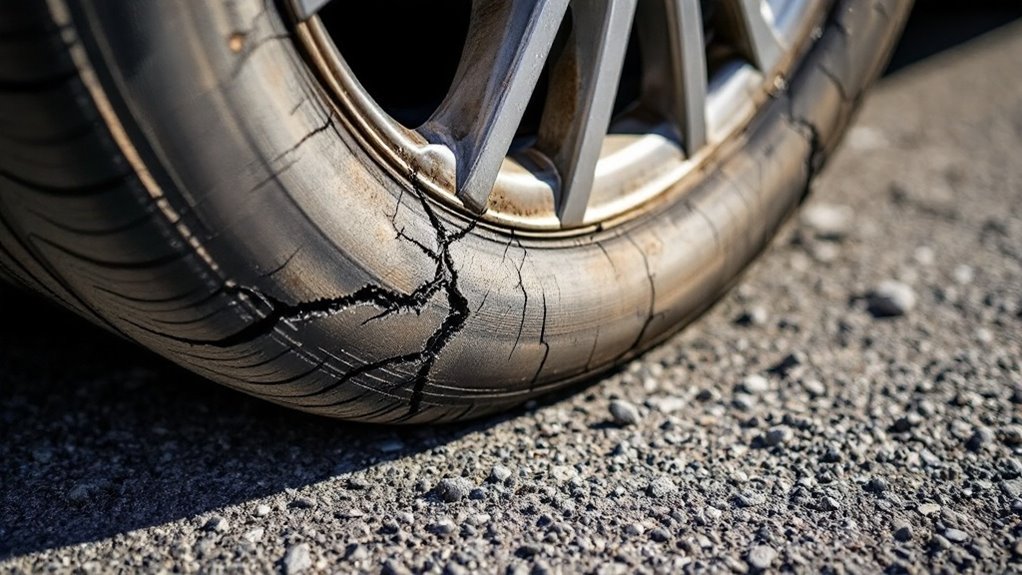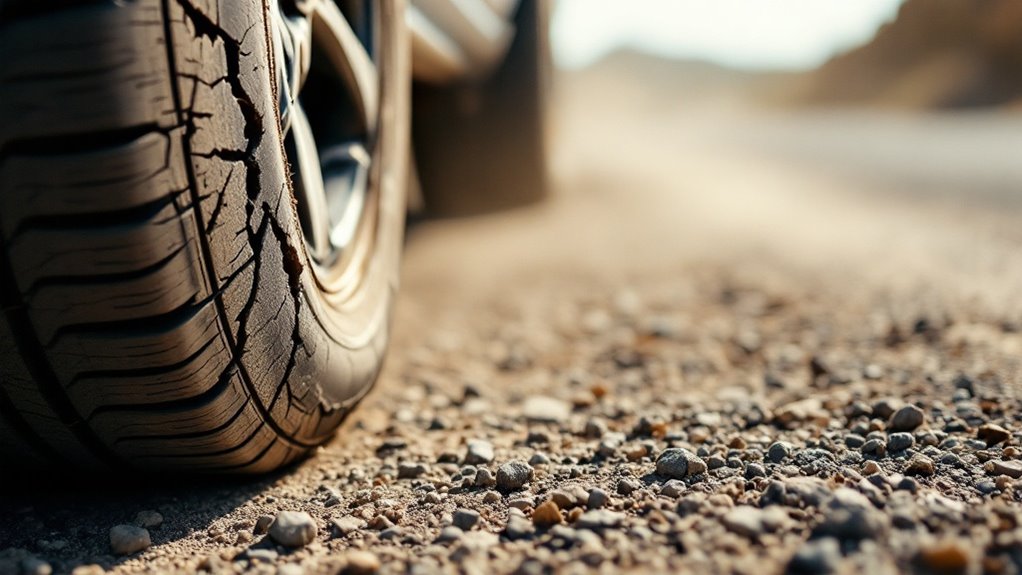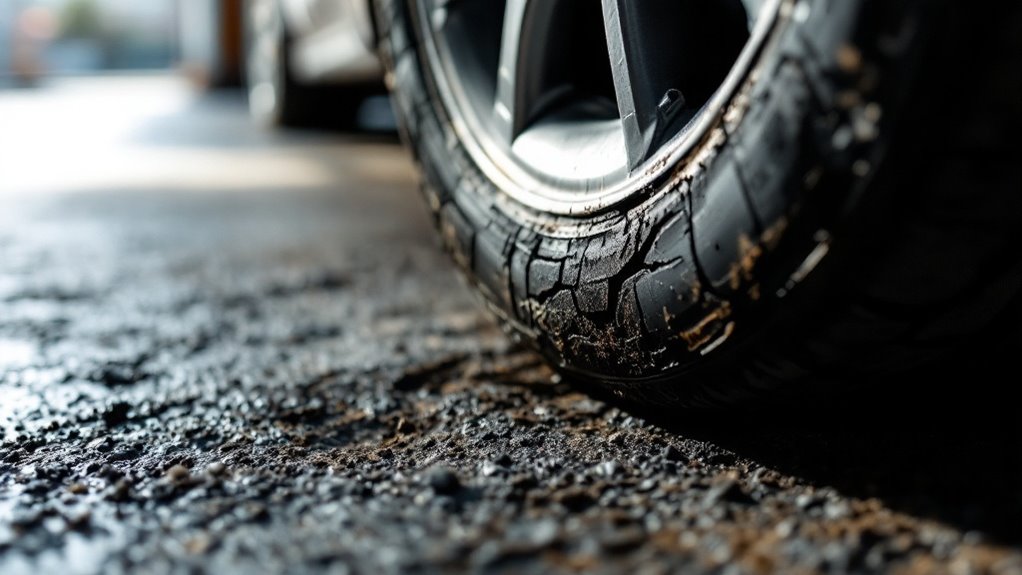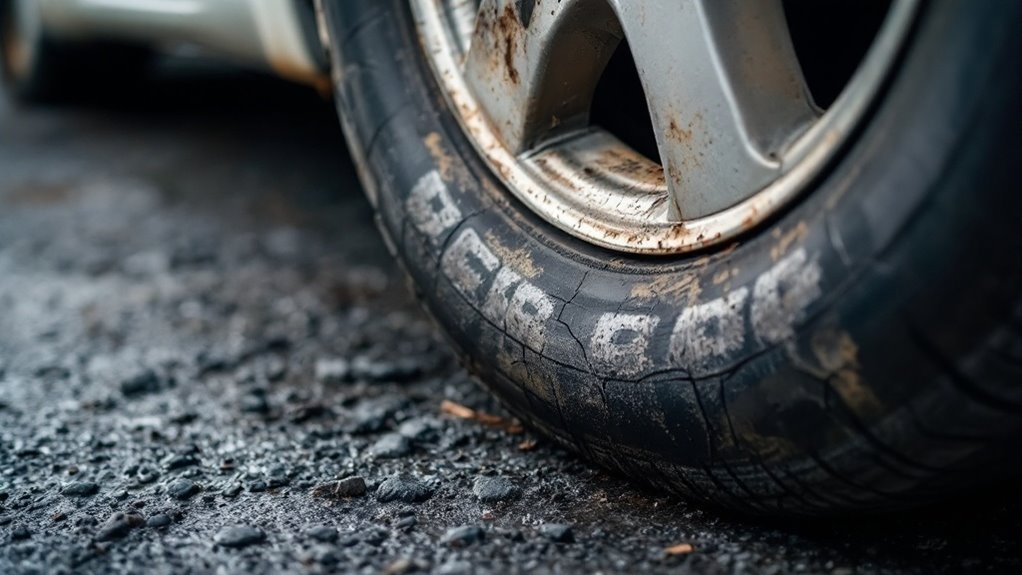Are Cracks In Tires Bad
This post contains affiliate links. As an Amazon Associate, we earn from qualifying purchases.
Cracks in tires are a big problem. They can make driving very dangerous. These cracks weaken your tires a lot. They happen from sun damage or low air. Road chemicals can also cause them. Cracks might lead to sudden blowouts. This is risky on fast roads. Sidewall cracks can leak air quickly. Check this fact: 11% of crashes connect to tire problems. Stay safe and learn how to stop cracks. Keep tires checked for any small damage. Simple steps can save your life.
Essential Facts in 30 Seconds
- Cracks in tires are dangerous and can cause sudden blowouts.
- They decrease grip on wet roads, making braking harder.
- Cracked tires pose a major safety risk while driving.
- Tire-related issues are linked to 11% of crashes.
- Ignoring tire cracks can lead to tread peeling and loss of control.
Understanding the Causes of Tire Cracks
Tires are tough, but they can still get damaged. Cracks in tires are a big problem. Let’s learn why they happen.
Sunlight harms tires with UV rays. It makes rubber weak over time. Parking outside a lot speeds this up. Hot or cold weather also hurts tires. Rubber loses bend and cracks form. Over time, this degradation can worsen, leading to increased failure risk. Additionally, the sidewall thickness of a tire can influence its susceptibility to cracking under stress.
Not taking care of tires causes trouble too. Low air pressure stresses the sidewalls. This leads to cracks fast. Oils and chemicals on roads damage rubber. Even ozone in the air weakens it.
Be careful where you park or drive. Check these main reasons:
- Sunlight Harm: UV rays break down rubber.
- Bad Care: Low air hurts sidewalls.
- Chemical Touch: Oils ruin tire strength.
Identifying Signs of Tire Damage

Check them closely for cracks or bulges. These show weak spots that can fail. Look at the tread for uneven wear too. This might mean alignment trouble. Hear odd noises or feel shakes while driving? That’s a big red flag! Understanding tire markings can also help you identify the right specifications for your vehicle.
For a better check, grab a tread depth gauge. Measure the wear easily with it. Test tire pressure often to spot leaks fast. Regular inspections can help prevent costly issues. Here’s what to notice:
- Cracks or Bulges: See them on sides or top? They mean trouble.
- Holes or Cuts: Spot small punctures? They can cause flats.
- Shaking: Feel constant vibrations? Damage might be inside.
Stay safe by checking tires regularly!
Exploring Risks Linked to Cracked Tires

Let’s talk about the dangers of cracked tires. They can really harm your safety. Cracked tires weaken and might burst suddenly. This happens often at high speeds. A blowout can make you lose control fast.
Sidewall cracks mess up air pressure inside. Tread cracks cut down your grip. Braking becomes hard, especially on wet roads. Handling your car feels risky too. Regular inspections can help prevent dangerous mishaps, and knowing the year of a tire is essential for understanding its overall condition.
Know these big risks with cracked tires:
- Blowouts: Cracks lead to quick air loss. You get no time to react.
- Tread Peeling: Cracks hide and tread can rip off. This risks crashes.
- Less Grip: Dry rot makes tires brittle. Control slips on wet streets.
Spot deep cracks? Act fast. They mean trouble is near. Fix them to stay safe on roads.
Data shows 11% of crashes link to tire issues. Don’t wait for danger. Check tires today.
Strategies for Preventing Tire Cracks

Cracked tires can be dangerous, but you can stop them easily. Take simple steps to keep your tires safe and last longer. Check them often. Look for small cracks every month. Keep the air pressure right. This stops heat from harming them. Rotate your tires too. It helps them wear out evenly.
Think about the weather as well. Sun and hot days hurt rubber over time. Store tires inside a garage if possible. Or use covers to block UV rays. Easy, right?
Check this table for quick tips to protect your tires:
| Strategy | Action |
|---|---|
| Monthly Checks | Spot cracks early every month. |
| Correct Air Pressure | Use the right PSI always. |
| Sun Protection | Cover tires outside in sunlight. |
| No Extra Weight | Stick to load limits strictly. |
| Clean Tires | Wash off dirt to avoid harm. |
Follow these tips daily. Your tires will stay safe. Risks will drop fast. Drive with no worries! Additionally, understanding the importance of tire size can aid in selecting the right tires for your vehicle.
Options for Repairing or Replacing Cracked Tires

Cracked tires can be a big problem. Let’s talk about fixing or replacing them.
Cracked tires, especially on the sidewall, are hard to repair. No safe, standard way exists to fix deep damage. Some try quick fixes like engine oil. But that can make things worse. It might even cause a sudden tire blowout.
Now, think about getting new tires. They cost more than used ones. Still, new tires are much safer. They last longer and lower the risk of accidents. Data shows blowouts cause over 11,000 crashes yearly in the US. So, safety matters a lot! Additionally, tire size significantly affects handling and can impact overall vehicle performance.
Check your tires often for cracks. Spot them early to avoid danger. Ask a tire expert for help. They can tell you if new tires are needed.
Here’s a simple breakdown:
- Can you repair cracks? No, only small tread holes get fixed.
- Cost of new tires? High, but worth it for safety.
- Risk of ignoring cracks? Deadly blowouts can happen fast.
Stay safe on the road. Don’t wait for a problem to grow!
Frequently Asked Questions
How Do Tire Cracks Affect Fuel Efficiency?
Tire cracks mess up your fuel efficiency big time. They boost rolling resistance fast. Your engine struggles more to move the car. This wastes a lot of gas. Studies show bad tires cut fuel efficiency by 10%. Keep tires in good shape always. Check them often for tiny cracks. Fix issues early to save money. Proper care means better gas mileage. Stay on top of tire maintenance now!
Can Tire Cracks Impact Vehicle Alignment?
Tire cracks can mess up your vehicle’s alignment. They show bigger problems underneath. Uneven tire wear happens because of bad alignment. Don’t skip this issue ever. Check your alignment soon for safety. Studies say 70% of drivers ignore tire cracks. This risks accidents on the road. Act now to stay safe. Keep your car in top shape. Drive with no worries!
Do Tire Cracks Influence Braking Performance?
Cracks in tires can boost braking distance by nearly 30%. Think about that! Weak grip from cracks makes stopping harder. Safety matters a lot. Don’t skip checking your tires. It’s a big risk to ignore this. Keep yourself safe on the road!
Are Certain Tire Brands More Prone to Cracking?
Got questions about tire brands cracking more often? Let’s dive right in. Some brands face more issues than others. Think about tire materials and how they hold up. Online forums mention Dunlop and Yokohama a lot. People flag them for cracking problems. Michelin pops up in discussions too. Studies show mixed results on durability. Check user reviews for real experiences. Stay curious and dig deeper into this!
How Do Tire Cracks Affect Warranty Claims?
Dive into the world of tire issues! Cracks can mess up warranty claims. Know the rules to avoid surprises. Tire cracks often mean wear or damage. Many warranties don’t cover this problem. Check your tire warranty for clear details. Got cracks? Act fast and file a claim. Show proof of purchase to support your case. Don’t wait—delays can hurt your chances. Fight smart for the coverage you deserve!
Conclusion
Think about tire cracks as a big red flag. They can spell danger for your safety. Don’t ignore them at all. Check your tires every month for any damage. Spot a crack? Act fast! Fix small cracks or replace bad tires right away. Talk to an expert to know the real risk. Keep your car safe for the road. Stop problems before they start. Maintain tires well and check pressure often. This avoids big, costly issues down the line. Stay safe with simple steps like these.
